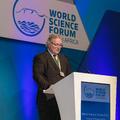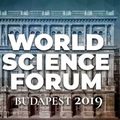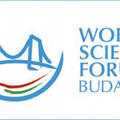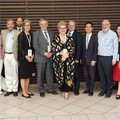World Science Forum Budapest 2007 - Washington, D. C.

Organized by the Hungarian Academy of Sciences together with UNESCO, ICSU, and the European Union, and followed with larger than usual international attention, World Science Forum - Budapest will get underway in a month's time, on 8 November, 2007. Its slogan (Investing in Knowledge: Investing in the Future) stresses the importance of knowledge resources in managing the future of the world's economies and societies. This November, scientists and decision-makers from over 60 countries will attend the latest of the bi-yearly event that has stirred spiralling international attention over the years. For three days, more than 300 invited scientists, laypeople, and politicians will hear out almost 60 lectures delivered at the Forum's plenary and section sessions.
Amid the ever-quickening pace of our world most politicians are preoccupied by natural catastrophes or an impending crunch of fuel resources. Little attention is paid to science, a state of affairs that certainly merits remedy. World Science Forum is important because it provides a platform for the dialogue of scientists and politicians. Furthermore, for science to become an integral part of mankind's vision of its future, it is inevitable that ordinary citizens, too, should view science as capable of sizeable contributions. Without such respect coming from society in general, and politicians in particular, it is unthinkable that science can receive the material support it needs and deserves.
Several 'bridge topics' deserve mention. One of the sections (Science and Innovation as a Global Enterprise) will deal with funding strategies and philosophies concerning research carried out in some of the richest countries. Heading the section will be Alan I. Leshner, Director of AAAS (American Association for the Advancement of Science). Participating in the work of the section will be such important officials as Arden L. Brement, President of the American National Science Foundation, the world's largest such organization, as well as Alan Bernstein, President of the Canadian Institutes of Health Research, Peter Nijkamp, President of the Dutch Science and Development Fund (NFWO), Roland Schenkel, Director General of the EU's Joint Research Center, and Ichiro Kanazawa, President of Japan's Science Council. Thus, with participating organizations representing the funding for well over 50 percent of the world's research, one can say that World Science Forum's potential is well understood by the richest sponsors of the world's science.
Another section set up by the Chinese Academy of Sciences is to address the science policy issues facing quickly developing nations. It will be in this section that renowned scientists and science policy-makers from e.g. China, Singapore, Malaysia, Turkey, and India will consider various strategies of funding science arising from quick economic growth.
On the very first day, the morning plenary session will feature a Meeting of Green Presidents.
The discussion will surely differ from the arguments usually expounded at environmentalist conferences. Here, environmentalism will be presented as an integral part of the interface of science and society, gaining more and more importance every day. Science has long realized that it is doomed to stagnation unless it does its job in peace and unison rather than in enmity with our living and lifeless environment. The session investigating the scope for sustainable development, and chaired by President of the Republic of Hungary László Sólyom, will hear out such other "green" European heads of state as
Heinz FISCHER, Federal President of the Republic of Austria,
Horst KÖHLER, President of the Federal Republic of Germany,
Stjepan MESIć, President of the Republic of Croatia,
Karolos PAPOULIAS, President of the Hellenic Republic.
The session will also hear greetings from UNESCO, ICSU, and the European Union. Representatives of such important international organizations as e.g. the OECD will also attend and address WSF.
In a round-table discussion organized by UNESCO, ministers from developing countries will consider how countries that are only beginning to take science-funding seriously can benefit from learning about the funding procedures applied in some of the richest countries.
On the second day of World Science Forum, i.e. on 9 November chief officials of the UN's Environment Program will launch a new international organization, the International Panel for Sustainable Resource Management.
At the closing session of 10 November Prime Minister of Hungary Ferenc Gyurcsány will address the Forum. Also speaking will be Speaker of the Hungarian Parliament Katalin Szili as well as Nobel Laureate Werner Arber, co-president of WSF's Steering Committee. Another important contribution will be made by President of UNESCO Koichiro Matsuura; he is expected to announce that the next World Science Forum of 2009 will fall on the tenth anniversary of UNESCO's 1999 World Conference of Science also held in Budapest. Thus, the 2009 World Science Forum will be entitled "Ten Years After", a theme that allows not only for retrospection but also for a look ahead at the tasks of upcoming decades of scientific research.
Further features of the program:
- representatives of several global fora including OECD, the World Bank, the Davos World Economy Forum etc. will share their experiences with the audience at World Science Forum;
- another meeting of Israeli and Palestinian scientists will take place at World Science Forum;
- MPs dealing with science in their respective parliaments will hold a workshop again at World Science Forum;
- the United Nations Environment Program will launch its new body "International Panel for the Sustainable Use of Natural Resources" at World Science Forum.
Further important speakers include:
Kati MARTON Chair, International Women's Health Coalition; Director, Committee to Protect Journalist,
Julia MARTON-LEFÈVRE Director-General, World Conservation Union (IUCN),
Goverdhan MEHTA President of ICSU,
Sir George RADDA University of Oxford; Chairman of the Singapore Bioimaging Consortium,
Roland SCHENKEL Director General, Joint Research Center, EU,
Walter ERDELEN Assistant Director-General for Natural Sciences, UNESCO,
El Hassan BIN TALAL Prince of Jordan, President of the Club of Rome,
Werner ARBER Nobel Laureate, Meetings of Nobel Laureates in Lindau; Co-Chair, Steering Committee, WSF.





